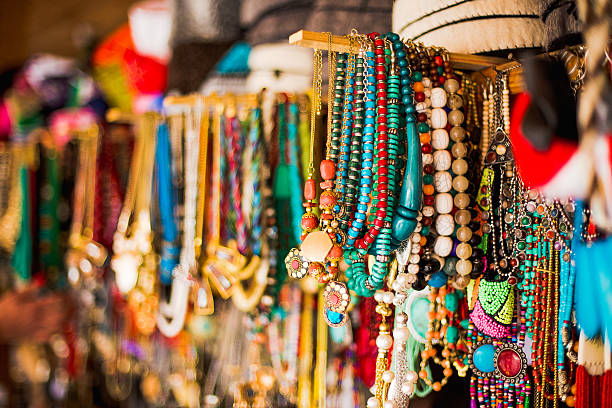One of the highlights of any trip is bringing home a souvenir that captures the essence of your experience—a tangible reminder of the culture, history, and memories you’ve made. However, finding genuine, meaningful souvenirs amidst the sea of mass-produced trinkets and touristy knick-knacks can be a challenge. It’s all too easy to end up with a cheap, low-quality item that lacks a true connection to the place you visited.
If you’re looking to bring home something truly authentic—whether it’s handcrafted by local artisans or a rare find that reflects the spirit of the place—follow these tips to avoid the tourist traps and shop like a local.
1. Seek Out Artisan Markets and Local Craft Fairs
Artisan markets are often the best places to find unique, handmade souvenirs that reflect the true culture of a region. These markets typically offer goods crafted by local artisans and are a great way to support small businesses.
Where to Look:
- Local craft markets: Many cities have weekly or seasonal markets where artisans and craftspeople gather to sell their work. These markets can offer everything from jewelry to pottery, textiles, and hand-carved wooden items.
- Specialty fairs and festivals: If you’re visiting during a local festival or cultural event, take advantage of the opportunity to browse handmade goods that are often specific to that time and place.
Why It’s Authentic:
The people selling their goods at these markets are often the creators themselves or small businesses that represent the local culture. You’ll find items that are one-of-a-kind and tied directly to the traditions of the area.
Tips for Finding Good Souvenirs:
- Look for items that showcase local materials or techniques (e.g., indigenous weaving, pottery from a local town, or woodcarvings made with regional woods).
- Ask about the process behind the creation of the item. Most artisans are happy to share the story of their work, giving you deeper insight into the culture behind it.
- Avoid mass-produced items that are simply branded with the city’s name or logo.
2. Visit Local Shops, Not Tourist Zones
While popular tourist areas are often home to brightly colored souvenir shops, they tend to sell generic, overpriced items. To find authentic souvenirs, venture beyond the main tourist zones to discover local shops that cater to residents rather than visitors.
Where to Look:
- Neighborhood shops: Explore districts where locals live and shop. Whether it’s a traditional bazaar in Istanbul, a quirky boutique in Paris, or a family-owned store in a small town, these places often offer items that reflect the true character of the area.
- Antique stores and vintage shops: These can be goldmines for finding authentic, historically significant items. Look for vintage postcards, maps, books, or even antiques that capture the essence of the place.
Why It’s Authentic:
In locally-owned shops, you’re more likely to find products that have been carefully curated to reflect the area’s traditions and style, often with an emphasis on quality and craftsmanship over mass production.
Tips for Finding Good Souvenirs:
- Strike up a conversation with the shopkeeper or owner. They often have great recommendations for authentic items and may even be able to point you toward hidden gems in the area.
- Pay attention to the materials used. A handmade scarf made from local wool or a piece of jewelry crafted with native stones will often be a better memento than something mass-produced.
- Avoid cheap, poorly made trinkets (like miniature Eiffel Towers or plastic snow globes), which are almost always imported and don’t reflect the true essence of the place.
3. Learn About Local Art and Craft Traditions
Every culture has its own unique forms of artistic expression—whether it’s weaving, pottery, metalwork, or embroidery. Understanding these traditions can help you spot truly authentic souvenirs while avoiding items that are made solely for the tourist market.
Where to Look:
- Museums and galleries: While you might think of museums as places for art exhibitions, many also have gift shops that offer carefully selected, high-quality pieces created by local artists.
- Workshops and studios: Some artisans offer tours of their workshops, giving you the chance to see the craft process firsthand and purchase items directly from the maker.
- Cultural centers and cooperatives: Look for local organizations that support regional craftspeople. Many countries have cooperative spaces where artists come together to sell their work, ensuring that you’re supporting local talent rather than mass-market production.
Why It’s Authentic:
Items made using traditional techniques (whether it’s pottery from a specific region, handwoven textiles, or locally dyed fabrics) reflect the heritage and culture of the place in ways that mass-produced items cannot.
Tips for Finding Good Souvenirs:
- Research the crafts of the region before you travel. Knowing about local art forms (like Navajo weaving in the American Southwest or batik in Indonesia) will help you spot authentic items.
- If you’re interested in a specific craft, seek out workshops or demonstrations to see how the items are made. Many artisans are happy to explain their techniques.
- Look for certification or proof of authenticity, such as marks of quality or a tag explaining the origins of the product.
4. Choose Items Made from Local Materials
A great way to find authentic souvenirs is by focusing on items made from materials that are unique to the region. Whether it’s textiles, wood, clay, or stone, choosing items made from local materials ensures you’re bringing home a piece of the land and culture.
Where to Look:
- Local farms or cooperatives: In many rural areas, local cooperatives or agricultural groups produce unique food products, oils, wines, and other items made from regional ingredients.
- Natural markets: Look for markets or shops that sell items made from local ingredients, such as handmade soaps, natural perfumes, or locally grown spices and herbs.
Why It’s Authentic:
Materials like local clay, regional wool, or indigenous herbs often come with a rich cultural story and are tied to traditional craftsmanship. These items often carry the essence of the place, unlike mass-produced goods.
Tips for Finding Good Souvenirs:
- Look for items that use sustainable, locally sourced materials (such as organic cotton, local stone, or native wood).
- Avoid items that feel overly synthetic or “plastic,” which are often produced en masse in factories for the tourist trade.
- Ask vendors where their products come from and how they’re made. Authentic artisans usually take pride in explaining the origins of their materials.
5. Avoid Souvenir Shops in High-Traffic Tourist Areas
Tourist-heavy areas tend to cater to visitors looking for quick, easy souvenirs. These shops often sell cheaply produced items that are manufactured elsewhere and just branded with the location’s name. To avoid these tourist traps, take a few steps off the beaten path and explore lesser-known areas of the city or town.
Where to Look:
- Local neighborhoods: Head into residential or lesser-visited districts, where you’re more likely to find authentic shops and artisans. Local markets, family-run shops, or small galleries are often less crowded with tourists and more likely to carry genuine, locally made products.
- Off-the-beaten-path attractions: Sometimes, the best souvenirs are found near quieter attractions or parks, rather than in the touristy heart of the city.
Why It’s Authentic:
Tourist-centric shops often sell mass-produced products made in other countries, with little connection to the place you’re visiting. Shopping away from tourist hubs gives you access to real local culture and craftsmanship.
Tips for Finding Good Souvenirs:
- Explore areas away from the main attractions, where locals shop.
- Look for items that have stories attached to them, rather than just ones that are “pretty” or easy to pack.
- If you’re in a country with many tourists, ask locals where they shop for gifts or souvenirs—they’ll likely point you to places that offer authentic products.
6. Support Ethical and Sustainable Souvenir Shops
In an age of mass production, many travelers are looking for ways to purchase souvenirs that are both authentic and sustainable. Support businesses that prioritize fair trade, ethical sourcing, and environmental consciousness.
Where to Look:
- Fair trade shops: Many cities and countries now have fair trade shops that sell locally made goods, from jewelry to homewares. These products are often ethically sourced and crafted by artisans in developing regions.
- Eco-friendly shops: Look for stores that promote sustainable practices, such as those selling recycled or upcycled materials, eco-friendly packaging, and products made with minimal environmental impact.
Why It’s Authentic:
Ethically made and fair trade items not only support the local community but also help preserve traditional crafts and promote sustainability. By purchasing from these shops, you’re ensuring that your souvenir is both meaningful and responsible.
Tips for Finding Good Souvenirs:
- Look for certification logos like “Fair Trade Certified” or “Made in X Country,” which often indicate ethical sourcing.
- Inquire about the environmental and social impact of the products you’re purchasing, and make sure the artisans are paid fairly for their work.
Finding authentic souvenirs is all about taking a step beyond the generic, touristy items that flood the market. By seeking out artisan markets, local shops, and crafts that reflect the culture and heritage of the region, you can bring home meaningful treasures that will remind you of your travels for years to come. So, shop like a local—be curious, ask questions, and always choose quality over quantity.

